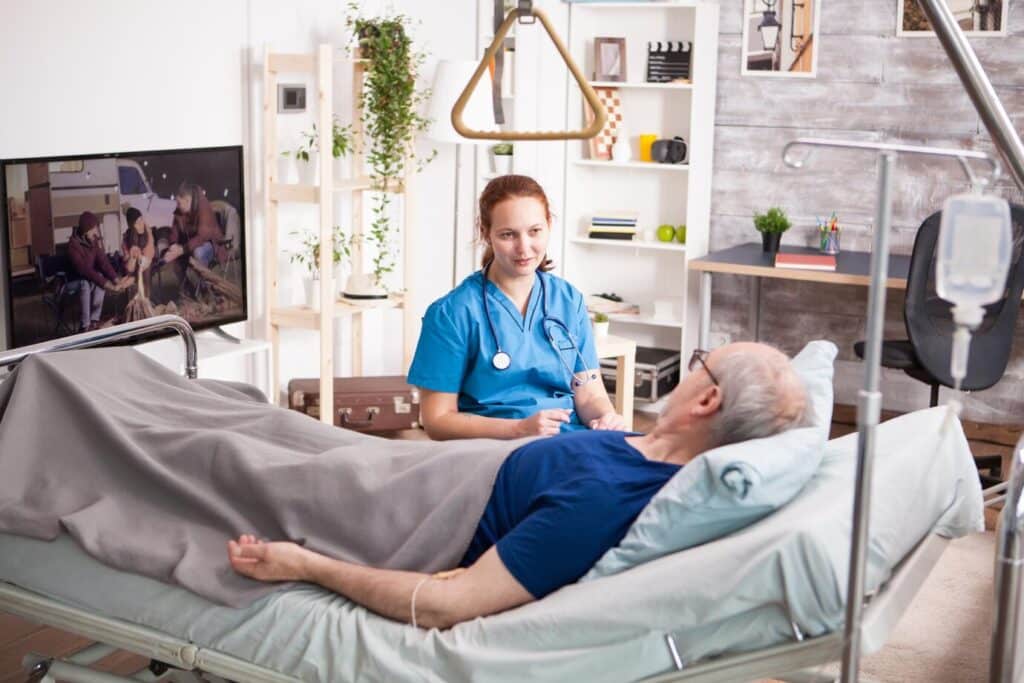Specialized Care for Diabetes and Related Health Conditions
For older adults managing chronic conditions, having access to specialized care for diabetes is crucial for maintaining independence and quality of life. Communities like The Oaks at Nipomo go beyond traditional support to offer tailored solutions for individuals living with diabetes, heart conditions, and more.
Through comprehensive diabetes care, medication support, personalized nutrition, and wellness monitoring, seniors receive not just medical attention but compassionate support that empowers them to thrive. From diabetes management to emotional wellness programs, these services represent a holistic approach designed for long-term health and well-being.
Personalized Diabetes Care for Better Health Outcomes
Managing chronic illnesses like diabetes can feel overwhelming, but specialized care for diabetes makes it manageable and even empowering. Skilled nurses provide routine blood sugar monitoring, administer insulin as needed, and educate residents on lifestyle habits to promote overall health. The inclusion of diabetes maintenance medicine ensures glucose levels stay stable while reducing the risk of complications.
Residents also benefit from customized nutritional plans that address specific needs, such as carbohydrate control and heart-healthy options. This integrated approach to diabetes care significantly improves daily life and long-term outcomes. As part of personalized wellness programs, residents receive coaching on exercise, mental wellness, and the proper use of diabetes maintenance medications, ensuring well-rounded care.
Learn more about managing diabetes from the Mayo Clinic’s diabetes care guide.
Taking Precautions for Type 2 Diabetes
Living with type 2 diabetes requires awareness, action, and ongoing care. Assisted living communities implement strict precautions for individuals with type 2 diabetes, helping residents avoid emergencies and manage daily challenges. These include blood glucose checks, regulated diets, regular activity programs, and proactive medication management.
Care staff monitor residents closely, watching for signs of hypo- or hyperglycemia and adjusting care plans accordingly. By following precautions for type 2 diabetes, seniors reduce the likelihood of serious complications like nerve damage or kidney disease. Additionally, trained caregivers educate residents on meal timing, hydration, and the proper use of diabetes maintenance medications.
For more on diabetic precautions, check the Cleveland Clinic’s advice on managing type 2 diabetes.
Holistic Cardiac Care and Chronic Disease Support
Aside from diabetes, many residents require specialized cardiac care. Regular blood pressure checks, medication adherence, and personalized low-sodium diets all support heart health. At The Oaks at Nipomo, diabetes care is often provided alongside cardiac support, offering a seamless healthcare experience.
Cardiac rehab exercises improve circulation and stamina, while staff offer emotional encouragement every step of the way. By combining cardiovascular and specialized care for diabetes, communities address multiple chronic conditions in harmony. With ongoing support and health education, residents become active participants in their own recovery.
Access to comprehensive healthcare services ensures optimal outcomes.
Family Involvement and Resident Safety
The road to wellness is not walked alone. Families are key partners in any care plan, and The Oaks at Nipomo encourages them to participate in regular meetings and updates. This collaborative approach promotes consistency and reinforces safety protocols.
Whether you’re assisting with diabetes care, reviewing changes in medication, or helping implement precautions for diabetes type 2, your input helps the care team align with the resident’s lifestyle and preferences. Through secure communication portals and scheduled check-ins, families remain informed and empowered.
A commitment to respect and transparency enhances trust between residents, staff, and loved ones.

Nutrition Tailored to Diabetic and Cardiac Needs
Meal planning is a cornerstone of effective diabetes care, and assisted living facilities prioritize customized, nourishing meals. Meals are crafted in consultation with dietitians and regularly adjusted based on blood sugar readings and overall health goals.
Here are four vital strategies used in managing nutrition for residents with specialized care for diabetes:
- Diabetic-Friendly Menus – Balanced with protein, fiber, and complex carbs.
- Medication Integration – Aligned with mealtimes for effective diabetes maintenance and medicine absorption.
- Monitoring Tools – Tracking intake and blood sugar responses.
- Dietary Education – Teaching residents how to make healthy food choices independently.
Nutrition not only impacts physical health but can boost mental clarity and mood. Good eating habits are a pillar of senior well-being, supported by research on aging and nutrition.
Recovery Services and Therapeutic Rehabilitation
Recovery from illness or surgery is smoother with personalized rehabilitation programs. These services often overlap with specialized care for diabetes, especially if complications like neuropathy or delayed healing are involved.
Customized Recovery Programs
Recovery plans include:
- Targeted exercise to build strength
- Pain management protocols
- Emotional support groups
- Nutrition tailored to diabetes maintenance medicine schedules
Each plan is revised regularly to reflect changes in mobility, mood, and health status, ensuring the resident remains on track toward full recovery.
Advanced Equipment and Therapeutic Tools
Modern technology supports recovery and diabetes care. From smart blood glucose meters to digital rehabilitation platforms, these tools offer more precise outcomes.
Emotional and Holistic Care
Support doesn’t end with the body. Emotional resilience plays a critical role in healing. Residents are encouraged to participate in mindfulness activities, group therapy, and engaging hobbies that improve quality of life.
Engaging Lifestyle Activities
Assisted living is about living fully and joyfully. Creative and physical programs keep residents engaged, active, and socially connected.
| Activity | Benefit | Frequency |
| Music Therapy | Uplifts mood, aids cognition | Weekly |
| Walking Groups | Supports blood sugar control | Daily |
| Gardening | Encourages physical activity | Weekly |
| Chair Yoga | Improves circulation | Several times a week |
| Cooking Class | Promotes healthy food awareness | Monthly |
These activities complement medical support by improving mood, building community, and enhancing both mental and physical health—all vital components of specialized care for diabetes.
Choose Specialized Care That Puts You First
Choosing the right assisted living facility can transform the experience of managing diabetes and other health challenges. At The Oaks at Nipomo, specialized care for diabetes is more than routine—it’s personalized, compassionate, and empowering.
With structured support including diabetes maintenance medicine, monitored nutrition, and guidance on precautions for diabetes type 2, residents live with more confidence and less stress. The integrated care model ensures that all aspects of wellness—from physical health to social connection—are nurtured daily.
To explore how The Oaks at Nipomo can support your journey or that of a loved one, schedule a visit today at Schedule a Tour or call us at (805) 723-5206. Experience a lifestyle where care and community go hand in hand.
How Do The Costs Of Moving Into A Quality Senior Care Community Compare With The Costs Of Staying At Home?Compare The Costs of Senior Living vs Staying at Home
Frequently Asked Questions
Which Speciality is for diabetes?
The medical specialty that focuses on diabetes is endocrinology. Endocrinologists specialize in the endocrine system, which includes glands that produce hormones such as insulin. Since diabetes is related to insulin regulation, endocrinologists are best equipped to manage the condition. Primary care doctors can also help with early-stage or well-managed diabetes.
What specialist studies diabetes?
An endocrinologist is a specialist who studies and treats diabetes. They receive advanced training in managing disorders related to hormones and metabolism, including Type 1 and Type 2 diabetes. Endocrinologists use lab tests, medical history, and lifestyle assessments to create customized treatment plans. Their expertise helps patients manage blood sugar levels and prevent complications.
What specialists help with diabetes?
In addition to endocrinologists, primary care physicians, dietitians, diabetes educators, and podiatrists often help with diabetes management. Each plays a unique role, from prescribing medications to offering nutritional advice and foot care. A coordinated team approach is often the most effective way to manage diabetes. This helps reduce risks and improve long-term outcomes.
What are the best practices for diabetes?
Best practices for managing diabetes include monitoring blood sugar levels regularly, eating a balanced diet, exercising consistently, and taking prescribed medications. Regular checkups with your healthcare team are crucial to catch any changes early. Stress management and adequate sleep also contribute to better blood sugar control. Personalized care plans are essential for successful diabetes management.








